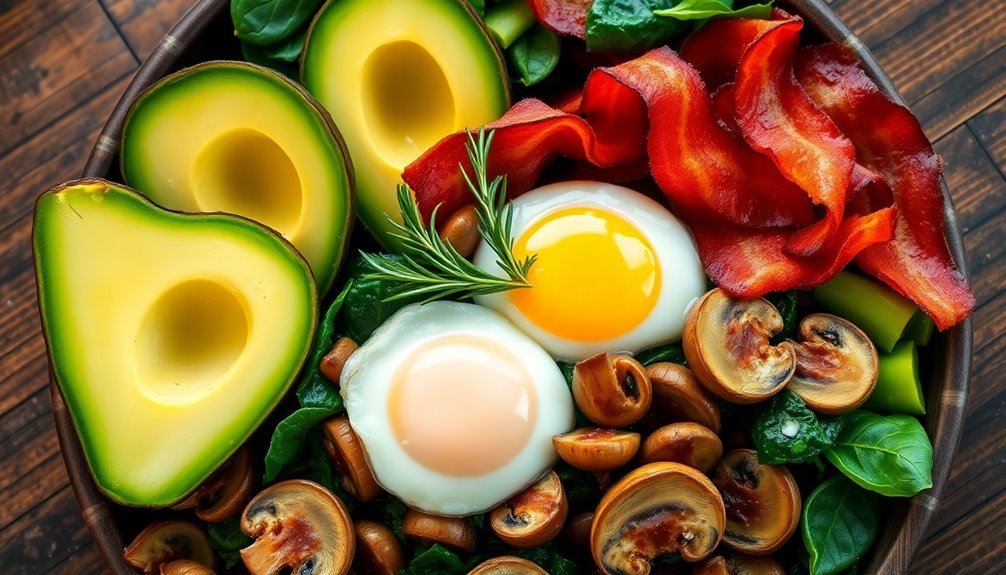The ketogenic (keto) diet involves drastically cutting carb intake to about 20-50 grams a day while increasing healthy fat consumption. This shift forces your body into ketosis, where it efficiently burns fat for fuel instead of carbohydrates. You'll experience benefits like stable energy levels, improved mental clarity, and reduced cravings. However, watch for potential challenges like the "keto flu" and nutrient deficiencies. To succeed, focus on high-fat, moderate-protein foods and plan your meals carefully. If you're curious about strategies to make keto sustainable and enjoyable long-term, there's more to discover.
Key Takeaways
- The Keto Diet involves drastically reducing carbohydrate intake to 20-50g/day while increasing healthy fats and maintaining moderate protein levels.
- It shifts the body into ketosis, promoting efficient fat burning and stable energy levels.
- Benefits include weight loss, improved mental clarity, stabilized blood sugar, and reduced cravings.
- Common challenges include "keto flu," nutrient deficiencies, and gastrointestinal discomfort during the adaptation phase.
- Success on the Keto Diet can be achieved through meal planning, batch cooking, and mindful eating practices.
What Is the Keto Diet?
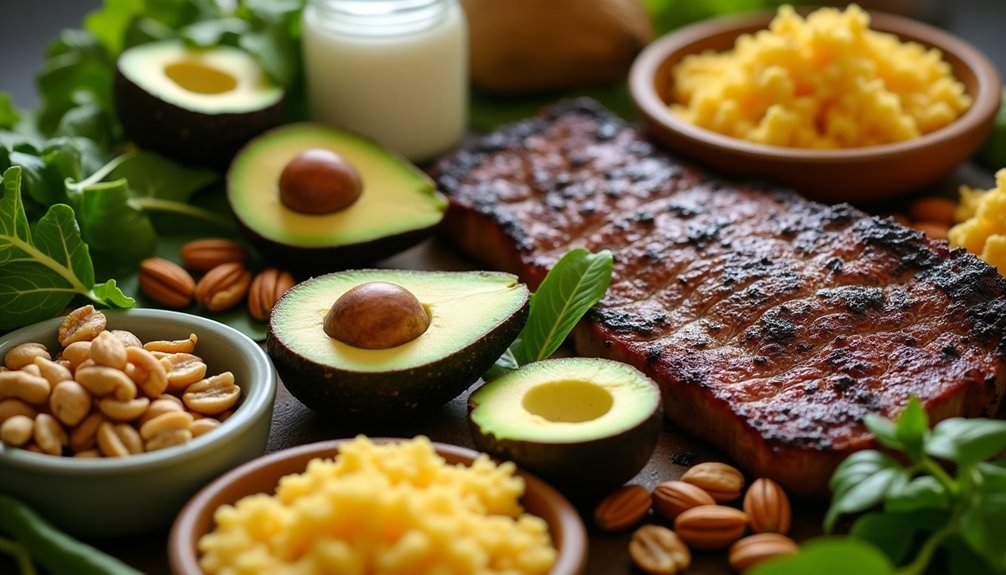
Understanding the ketogenic diet begins with recognizing its fundamental principle: a significant reduction in carbohydrate intake, which shifts your body into a state of ketosis. This metabolic state is where your body becomes highly efficient at burning fat for energy instead of glucose.
The keto diet basics involve drastically cutting carbs—typically to around 20-50 grams per day—while increasing your intake of healthy fats to approximately 70-80% of your daily caloric intake. Moderate protein consumption, around 15-30%, is also vital.
Ketosis explained can be likened to a switch that flips in your body. When carb intake is low, insulin levels drop, prompting the liver to convert fatty acids into ketones, which serve as an alternative energy source. This shift not only enhances fat burning but also stabilizes blood sugar levels, providing a steady energy supply throughout the day.
Adopting the keto diet can feel overwhelming at first, but it's crucial to remember that you're not alone in this journey. Many find community support through online forums, social media groups, and local meet-ups, where you can share recipes and experiences. Additionally, being aware of the negative effects of traditional bread can help reinforce your commitment to a low-carb lifestyle.
As you navigate the initial stages of the keto diet, focusing on whole foods like avocados, nuts, and leafy greens can make a significant impact. By understanding these fundamentals and embracing the changes, you'll pave the way for a successful keto lifestyle that aligns with your health goals.
Benefits of the Keto Diet
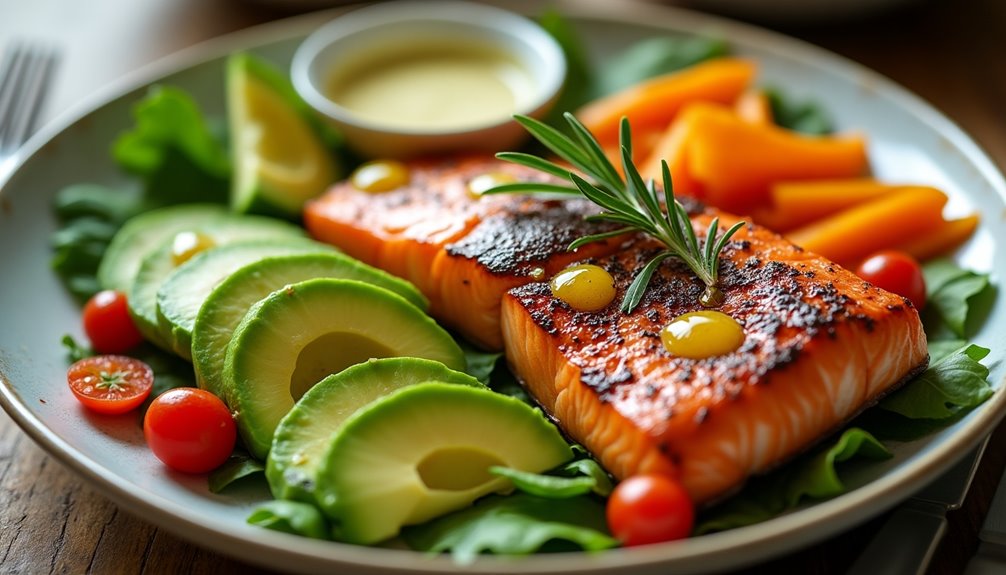
The ketogenic diet offers a range of benefits that extend beyond weight loss, making it an appealing choice for many. One of the most significant advantages is its ability to promote effective fat burning. When you lower your carbohydrate intake and increase healthy fats, your body enters a state of ketosis, which encourages it to utilize fat as its primary energy source. This process not only aids in weight loss but also helps stabilize blood sugar levels, leading to fewer cravings and a more manageable appetite.
In addition to weight loss, many individuals report experiencing improved energy levels on the keto diet. Once your body adapts to burning fat for fuel, you might notice a remarkable increase in your stamina and overall energy throughout the day. Unlike the quick spikes and crashes associated with a high-carb diet, the steady release of energy from fat can help you feel more focused and alert.
Furthermore, the ketogenic diet is associated with various health benefits, including better mental clarity and potential improvements in mood. By consistently providing your brain with a reliable energy source, you may find it easier to concentrate and stay on task. Many people also enjoy the variety of delicious Keto recipes that make meal planning more enjoyable and sustainable.
The sense of community and support within the keto lifestyle can also enhance your commitment to the diet. Surrounding yourself with like-minded individuals who share similar goals fosters a sense of belonging that can keep you motivated. Whether you're aiming for weight loss or seeking improved energy, the keto diet offers a holistic approach to better health and well-being.
Potential Challenges and Side Effects
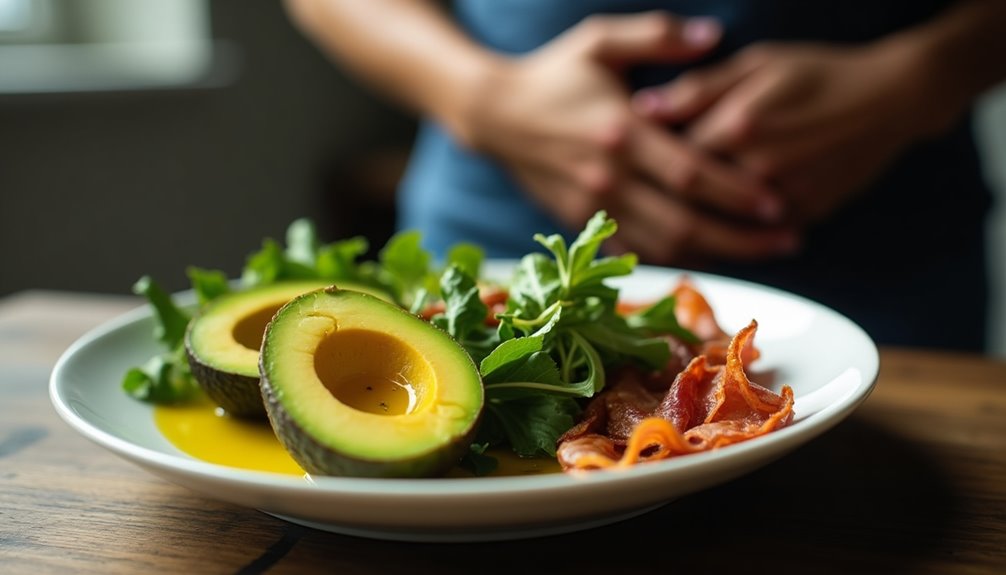
What should you be aware of when starting the ketogenic diet? While many individuals find success with keto, there are potential challenges and side effects you should know about before diving in. One of the most common issues is the "keto flu," which can occur as your body adjusts to burning fat instead of carbohydrates. Symptoms may include headaches, fatigue, irritability, and nausea. This adaptation phase usually lasts a few days but can be uncomfortable.
Another important consideration is the risk of nutrient deficiencies. By significantly decreasing carbohydrate intake, you mightn't get enough essential vitamins and minerals, especially if you're not mindful about your food choices. Nutrient deficiencies can lead to fatigue, weakened immunity, and other health issues. To address this, focus on incorporating a variety of low-carb vegetables, healthy fats, and quality protein sources into your meals.
Furthermore, some individuals experience gastrointestinal discomfort, such as constipation or diarrhea. This can be due to changes in fiber intake or the types of fats consumed. Staying hydrated and ensuring you consume sufficient fiber can help alleviate these issues.
Lastly, keep in mind that the ketogenic diet isn't suitable for everyone. If you have existing health conditions, it's essential to consult with a healthcare professional before making significant dietary adjustments. By being aware of these potential challenges, you'll be better equipped to navigate your ketogenic journey effectively. Additionally, incorporating natural daily metabolic processes can enhance your experience and help you achieve ketosis more smoothly.
Foods to Include and Avoid
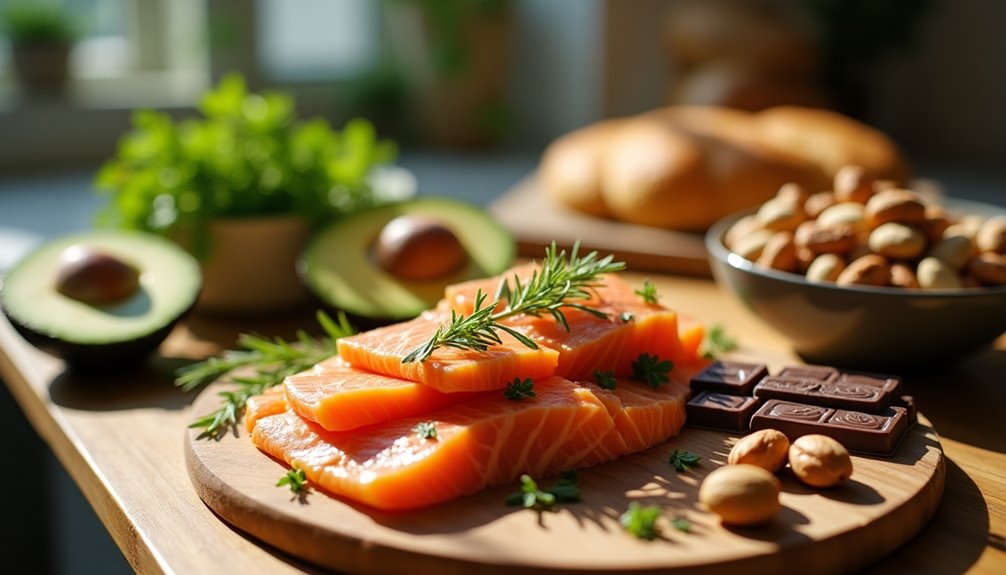
When starting on the ketogenic diet, knowing which foods to include and avoid is essential to your success. The primary goal of this diet is to shift your body into a state of ketosis, where it burns fat for fuel instead of carbohydrates. To achieve this, focus on incorporating high-fat, moderate-protein, and low-carb foods into your meals.
Include plenty of healthy fats such as avocados, nuts, seeds, and olive oil. These not only provide energy but also keep you feeling full. Protein sources like grass-fed meats, fatty fish, and eggs are vital, too.
For vegetables, stick to non-starchy options like leafy greens, broccoli, and zucchini, which are low in carbs. When you're looking for a quick bite, opt for keto friendly snacks like cheese, beef jerky, or homemade fat bombs. Additionally, consider utilizing the progress tracking tools available in a custom keto diet plan to monitor your adherence and success on the journey.
On the flip side, it's crucial to avoid high-carb foods. This means steering clear of grains, sugar, and starchy vegetables. Be especially vigilant about hidden sugars, which can lurk in sauces, dressings, and processed foods. Always read labels carefully to make sure you're not consuming unexpected carbs.
Tips for Success on Keto
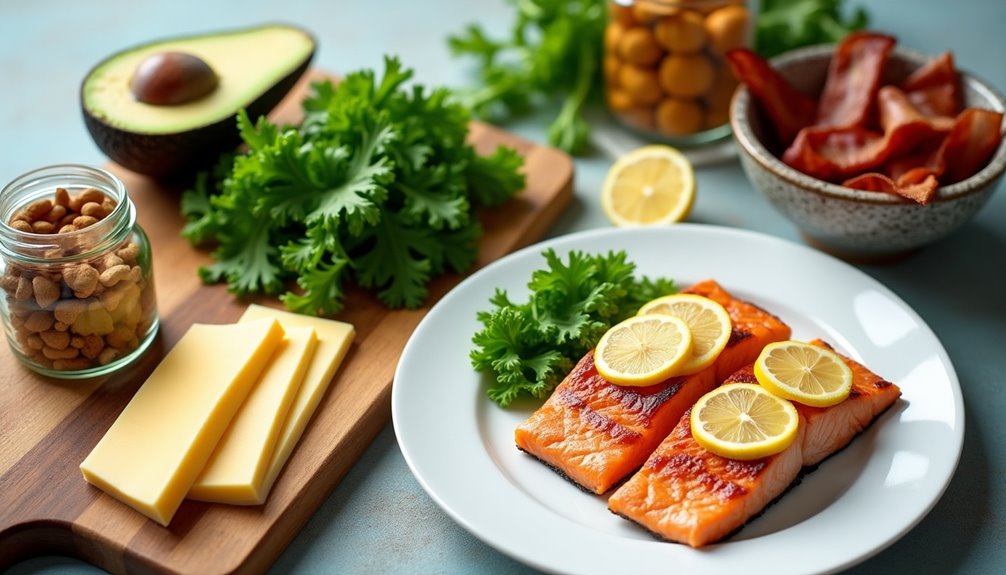
Successfully managing the ketogenic diet often requires careful planning and commitment. One of the most effective strategies you can implement is meal planning. By dedicating time each week to prepare your meals, you'll not only save time but also guarantee you're sticking to your macro goals.
Focus on incorporating high-fat, low-carb foods, and consider batch cooking to simplify your weekly routine. This proactive approach helps you avoid impulse eating and keeps you aligned with your dietary objectives.
Navigating social situations can be challenging on a keto diet, but it doesn't have to be overwhelming. Communicate your dietary preferences to friends and family, and don't hesitate to suggest keto-friendly options when dining out. Many restaurants now offer low-carb meals, making it easier to enjoy social gatherings without compromising your commitment.
If you're attending a potluck, consider bringing a delicious keto dish to share. This not only showcases your dedication but also opens the door for others to explore the benefits of a ketogenic lifestyle.
Lastly, connect with others who share your interest in keto. Joining online forums or local support groups can provide valuable insights and encouragement. Sharing your experiences and challenges creates a sense of belonging, making your journey more enjoyable. Remember, success on keto isn't just about the food you eat; it's about building a lifestyle that supports your health and well-being. With these tips, you're well-equipped to thrive on your ketogenic journey. Additionally, incorporating a variety of plant-based foods into your diet can also enhance your overall health while following keto principles.
Frequently Asked Questions
Can I Drink Alcohol on the Keto Diet?
You can certainly enjoy alcohol consumption, but selecting wisely is crucial. Opt for keto-friendly drinks like dry wines, spirits, or sugar-free mixers, which have minimal carbs. Be cautious, as alcohol can impact your body's metabolism and may result in stalls in weight loss.
Always stay hydrated and monitor your intake to uphold your goals. Finding balance enables you to enjoy social occasions while adhering to your dietary preferences.
How Long Does It Take to Enter Ketosis?
Entering ketosis typically takes about 2 to 7 days, depending on your body and dietary adjustments. This ketosis schedule may vary if you're significantly reducing carbs or increasing physical activity.
As your body adjusts, you may encounter the keto flu, characterized by symptoms such as tiredness and headaches. Maintaining proper hydration and balancing electrolytes can alleviate these symptoms.
Keep in mind, each individual's experience is distinct, so pay attention to your body throughout this adjustment period.
Is the Keto Diet Safe for Everyone?
Imagine crossing a rickety bridge; it might be safe for some, but not for everyone. The same goes for certain diets. If you have specific medical conditions, like diabetes or kidney issues, consulting a healthcare professional is necessary.
While many thrive on this diet, long-term effects can vary. Staying informed and listening to your body is vital, ensuring you're making choices that support your well-being and sense of belonging in a community.
What Is the Difference Between Keto and Low-Carb Diets?
The primary difference between keto and low-carb diets lies in their nutritional differences. Keto typically emphasizes high fat intake while drastically reducing carbohydrates, aiming for ketosis.
In contrast, low-carb diets allow for a broader range of carbohydrates, focusing more on overall reduction rather than strict limits.
These variations can lead to different health implications; keto may promote rapid weight loss, while low-carb diets might be more sustainable for long-term health without the strict constraints.
Can I Do Keto if I'm Vegetarian or Vegan?
Yes, you can follow a keto diet as a vegetarian or vegan. By using keto-friendly substitutions, you can create meals that fit your dietary preferences.
Focus on plant-based protein options like tofu, tempeh, and legumes, while incorporating healthy fats from avocados, nuts, and seeds.
With careful planning and creativity, you can enjoy satisfying meals that meet your nutritional needs without compromising your values or goals.
Embrace the challenge, and enjoy the journey!
Conclusion
So, if you're ready to embrace a life where bacon is a food group and carbs are the enemy, the keto diet might just be your new best friend. Just remember, while you're reveling in cheese-induced bliss, your body might be sending you some not-so-subtle hints about missing fruits and grains. After all, who needs fiber when you can have all that glorious fat? Just keep an eye on those pesky side effects—like your brain fogging up faster than a window in a sauna!

